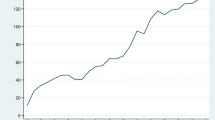Abstract
Much of the research on the role of firm-specific advantages on firms' subsidiary ownership preferences has been undertaken in the context of advanced-country multinationals, specifically U.S. MNCs. Research has found that U.S. firms derive ownership advantages from their size, experience, and technological and marketing superiority. Perhaps having operated in the most-developed and sophisticated home market, many U.S. firms generate unique skills that give them absolute advantages over firms in almost all foreign host locations. Developing-country MNCs do not have absolute ownership advantages similar to those of the U.S. firms. The relevance of a particular firm-specific characteristic for a developing-country MNC may be contingent not only upon the home-country characteristics, as in the case of U.S. MNCs, but also upon host-country characteristics. This study investigates the subsidiary ownership preferences among Korean MNCS and finds that the influence of three firm-specific advantages—technological intensity, product differentiation and capital intensity—on subsidiary ownership levels is contingent upon whether the subsidiary is located in a relatively less-developed or a more-developed country as compared to the home country. Although some authors have suggested that the influence of firm-specific advantages may be contingent upon the characteristics of both home- and host-country locations, empirical investigations to this effect have been nonexistent.
Similar content being viewed by others
Author information
Authors and Affiliations
Additional information
*M. Krishna Erramilli is Senior Lecturer at the Nanyang Business School, Nanyang Technological University (NTU), Singapore. He is also the Associate Director for the Leadership and Management Program organized by NTU and DuPont Asia Pacific. His research interests are in market entry strategies and international business theory. This is his third publication in JIBS. He has also published in the Journal of Marketing, Columbia Journal of World Business, Management International Review, and the Journal of Business Research, among others.
**Sanjeev Agarwal is Associate Professor of Marketing at Iowa State University, Ames, Iowa. His current research interests pertain to international marketing issues in entry, organization, and strategy. His work has appeared in the Journal of Consumer Research, Journal of the Academy of Marketing Science, Journal of Personal Selling and Sales Management, Journal of International Business Studies, Journal of Internatiana1 Marketing, Industrial Marketing Management and International Marketing Review, among others.
***Seong-Soo Kim is the Manager for International Cooperation in the Semiconductor Division of Samsung Corporation, Korea.
Rights and permissions
About this article
Cite this article
Erramilli, M., Agarwal, S. & Kim, SS. Are Firm-Specific Advantages Location-Specific Too?. J Int Bus Stud 28, 735–757 (1997). https://doi.org/10.1057/palgrave.jibs.8490117
Received:
Revised:
Accepted:
Published:
Issue Date:
DOI: https://doi.org/10.1057/palgrave.jibs.8490117




